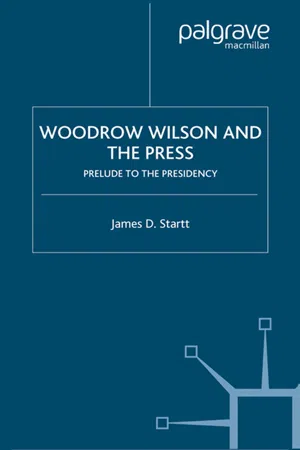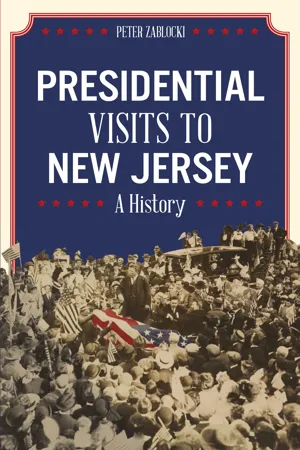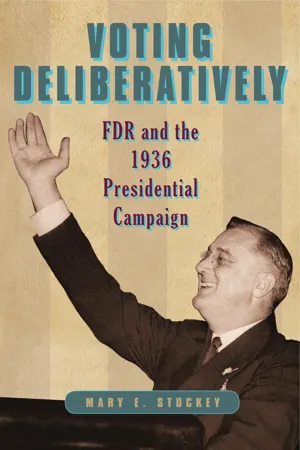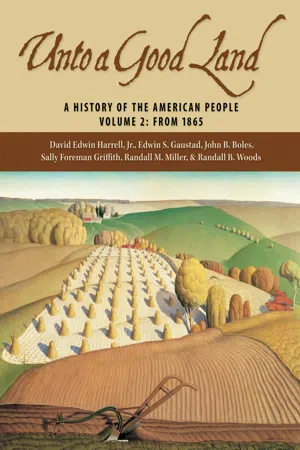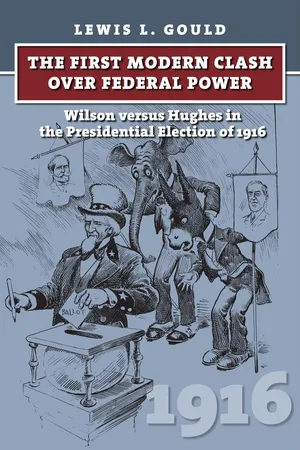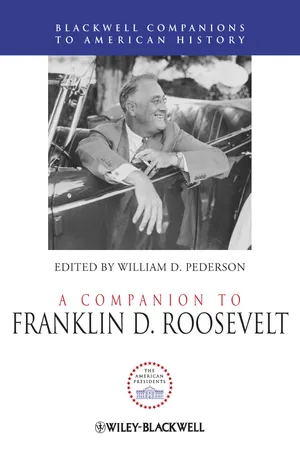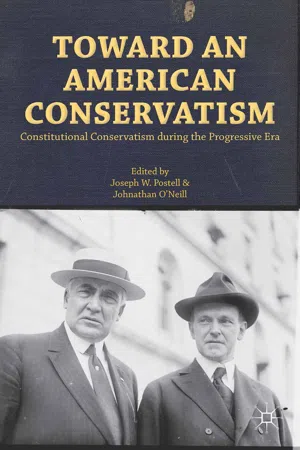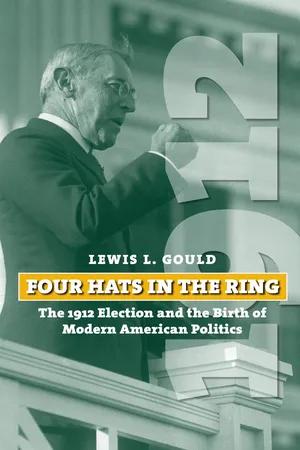History
1912 Presidential Election
The 1912 election in the United States was a significant political event that saw a four-way race between Woodrow Wilson, Theodore Roosevelt, William Howard Taft, and Eugene V. Debs. The election marked a turning point in American politics, with Wilson ultimately winning and the Progressive Party gaining prominence. This election also highlighted the growing influence of third-party candidates in national politics.
Written by Perlego with AI-assistance
Related key terms
1 of 5
8 Key excerpts on "1912 Presidential Election"
- eBook - PDF
Woodrow Wilson and the Press
Prelude to the Presidency
- J. Startt(Author)
- 2004(Publication Date)
- Palgrave Macmillan(Publisher)
Chapter 9 Wilson’s Election Campaign of 1912 and the Press Despite the widespread assumption at the outset that Wilson would win, the election of 1912 was a fascinating contest rich in significance. The reasons for this go beyond the Roosevelt–Taft break and the subse- quent three-way race for the presidency. A Democratic victory would mean that, after losing four consecutive presidential elections, the party of Jefferson and Jackson would regain the White House and probably have substantial majorities in both the House and the Senate for the first time, with only slight exception, since the Civil War. 1 It would also mark the reentry of the South into the main current of national politics, and with the exit of so many progressives from Republican ranks, it would have long range ramifications on the character of the Republican party. The election, moreover, occurred at the high tide of progressivism in presidential election politics, and now that Wilson had undergone, as historian Robert H. Wiebe said, “the intellectual migration of his gener- ation,” he, as well as Roosevelt, could lay claim to the progressive vote. 2 There were, of course, differences between Wilson and Roosevelt, his foremost opponent, about how progressivism should be interpreted and implemented. Roosevelt called his progressive program the New Nationalism. Rooted in the Square Deal program he championed as president and further defined in his subsequent speeches, the New Nationalism called for increased activity of the federal government in American business and life. Roosevelt accepted the large size of business corporations as a fact of modern society, but he believed that the public, acting through the agency of the federal government, should exert control over them. Tariff revision by means of an impartial commission of experts was central to his program, but sometimes during the campaign he gave a protectionist twist to his views on the tariff. - eBook - ePub
Presidential Visits to New Jersey
A History
- Peter Zablocki(Author)
- 2022(Publication Date)
- The History Press(Publisher)
4 THE THREE-CORNERED RACE OF TAFT, ROOSEVELT AND WILSONThe election of 1912 was very contentious and memorable in the annals of American history. It is also the first one that really stood out for New Jersey. For one, it pitted a Garden State favorite, Theodore Roosevelt, against the incumbent, Howard Taft (the two men who collectively, with the late William McKinley, had made New Jersey a red state for the past four elections). But to make matters even more interesting, it brought into the fold the state’s adopted son and then-current governor, Woodrow Wilson, for a truly New Jerseyan affair. The verdict for which way the state would swing hung in the air for months, making it a perfect microcosm of the national tension that kept voters agitated for months before November. By the summer of 1912, it was evident that New Jersey had become a battleground in an election that featured a then-current president, a former president, and the then-current head of the Garden State. The script hinted at drama, and it delivered.THE THREE -CORNERED RACE FOR the presidency of the United States began on February 24, 1912. A jubilant and still massively popular Teddy Roosevelt proclaimed to have thrown his “hat in the ring,” challenging his onetime friend and political successor, Howard Taft, for the Republican ticket. Having deflected the rumors that he was going to run for a third term, Roosevelt was persuaded to seek the nomination by a handful of progressive state governors who asked him to put his objections to the idea aside for the betterment of the nation. Teddy accused the president of yielding to “the bosses and to the great privileged interests [being] disloyal to every canon of ordinary decency.”54 Yet Taft would not go down without a fight. Thus began the first-ever campaign by a current president in the primaries for the backing of his own party. “I am in this fight,” he promised, “to perform a great public duty, the duty of keeping Theodore Roosevelt out of the White House.”55 - eBook - PDF
Voting Deliberatively
FDR and the 1936 Presidential Campaign
- Mary E. Stuckey(Author)
- 2015(Publication Date)
- Penn State University Press(Publisher)
Going into the 1936 campaign, then, the nation had been long consumed with conversations about the damaged economy and how best to repair it, about the national government and how much power to give it, and about the nation itself and how best to lead it. Roosevelt had a wide-ranging, if not always coherent, set of answers to these questions. His various opponents had a vari- ety of objections to his policies and a broad range of alternatives. The election was, therefore, practically a textbook case of the possibilities for deliberation in a democratic republic. It was a referendum on the president and a test of the relationship he had forged with the American people. It was also a proving 14 voting deliberatively ground for his theories of governance—theories that turned on the new cul- tural emphasis on science and efficiency, manifested in public-opinion polls; that depended on the mobilization of the mass public; that understood the pub- lic as composed of economic and ascriptive groups; and that sought to unify those groups through an avowedly nationalistic set of rhetorical appeals. The 1936 election validated both these theories and the president’s leadership and proved to be the pivotal moment in the creation of the New Deal coalition and the practice of American elections. The 1936 Campaign We think of presidential campaigns as confined processes, engaged in between candidates from two major parties who seek to influence voters in specifically targeted states. They are, however, also more than that. They are national con- versations about the policies, parties, and people who will govern the nation, and they involve members of the mass public, organized by party but also along the lines of interest groups and demographics, as well as unaffiliated and sometimes even uninterested citizens. Elections are opportunities to engage in debate as well as to make decisions. - eBook - ePub
Unto a Good Land
A History of the American People, Volume 2: From 1865
- David Edwin Harrell, Edwin S. Gaustad, John B. Boles, Sally Foreman Griffith(Authors)
- 2005(Publication Date)
- Eerdmans(Publisher)
24
Progressivism in American Politics, 1901 to World War I
Chapter 24 at a Glance The Core of the Progressive Agenda The Urban Social Justice Movement Saving the WASP Empire Local and State Political Reform Reorganizing American Cities Progressivism in the States Electoral Reform—Democratic and Undemocratic States Provide Models for Progressive Legislation Theodore Roosevelt and the Selling of National Progressivism Theodore Roosevelt Takes Center Stage The Extension of Regulation and Trustbusting Political Victory and the Square Deal A Beginning for Conservation Roosevelt Drifts to the Left Competing Progressive Visions Roosevelt Picks His Successor Taft Alienates the Progressives The Rift between Roosevelt and Taft The Election of 1912 Wilsonian Progressivism The Scholar President Congress Backs the President Expanding the New Freedom Conclusion: The Legacy of Political ProgressivismT HE ANXIETIES CAUSED by rapid social and economic change at the turn of the century defined the Progressive Era as a time of causes and crusades. The reform sentiment of the period took on added significance because most progressives looked to government to restore the American dream, and they relished political combat. The governmental reforms of the Gilded Age, including civil service reform and the growing professionalization of the Washington bureaucracy, had set the stage for the progressive movement, and the election of 1896 had provided an agenda for the progressive presidents of the early twentieth century—Theodore Roosevelt, William Howard Taft, and Woodrow Wilson. Progressives backed a broad array of social, economic, and political reforms; no one person was likely to embrace all of them. The federal government enacted the era’s most far-reaching legislation, but progressives won their first political successes at the local and state levels.Nationally, the Progressive Era witnessed a renaissance of presidential leadership, conspicuously lacking in the Gilded Age. Roosevelt and Wilson are generally ranked among the nation’s greatest chief executives, and Taft was a competent (if politically clumsy) and somewhat underrated president. Surrounding these presidents were a colorful and vigorous cast of political characters whose thought and actions helped shape modern America. - eBook - ePub
The First Modern Clash over Federal Power
Wilson versus Hughes in the Presidential Election of 1916
- Lewis L. Gould(Author)
- 2016(Publication Date)
- University Press of Kansas(Publisher)
Hilles, the holdover chair of the Republican National Committee from the Taft administration, predicted “that the Republican party will return to power in 1916.” Furthermore “the issue in 1916 will be squarely on the tariff and on the legislation of the Democratic party.” Labor and business would unite to overthrow Wilson and his party. “The public has sickened of the nostrums and panaceas exploited in the past few years,” Hilles concluded. Two decades after William McKinley had led the Grand Old Party to the White House, Republican leaders did not expect the war to stand in the way of the economic issue that would result in another election victory along the lines of 1896. 25 The big losers in the 1914 contests were Theodore Roosevelt and the dwindling remnants of his Progressive Party. Without the stimulus of a presidential election and even with Roosevelt’s energetic campaign, the third party almost disappeared. Their congressional delegation in the House was cut in half to nine and only one Progressive member remained in the Senate. Such party stalwarts as former secretary of the interior under Roosevelt, James R. Garfield, and former senator Albert J. Beveridge in Indiana made poor showings in gubernatorial races in their states. The reelection of Hiram Johnson as governor of California was the lone bright spot. “East of Indiana,” wrote a disappointed Roosevelt, “it would be mere silliness and fruitful of nothing except a trifle or mischief to endeavor at present to continue action along Progressive lines exactly as we have done.” 26 In the West, Roosevelt concluded, “the party must keep up.” Because the country “was sick and tired of reform,” the best the Progressives could do was to exist only on a state-by-state basis. 27 It was a long way from the optimism of the third party in 1912. The outbreak of the war had traumatized Roosevelt in both a personal and professional sense, and he focused his energies more and more on foreign policy - eBook - ePub
- William D. Pederson(Author)
- 2011(Publication Date)
- Wiley-Blackwell(Publisher)
Chapter Five THE ELECTION OF 1932 Donald A. Ritchie The process of deciphering the 1932 election began as soon as the campaign had ended. It quickly became a truism that the Great Depression had doomed Herbert Hoover’s chances of reelection and paved the way for Franklin D. Roosevelt’s presidency. Less attention was therefore devoted to why Roosevelt won than on whether or not his campaign adequately prepared the nation for his New Deal agenda. By all accounts, the 1932 election marked a watershed in American politics. The Great Depression profoundly shook American voters, forcing them to reexamine their political allegiances and expectations for the federal government. After being the dominant political party since the Civil War, Republicans were dethroned and Democrats became the majority party for most of the next half century. Herbert Hoover, who had won the presidency in a landslide four years earlier, lost it in an even greater electoral avalanche. Franklin Roosevelt swept into the presidency promising a new deal for the American people. Democrats added 99 seats in the House and a dozen new senators to give them overwhelming control of Congress, and a readiness to follow the new president wherever he led, to get the nation out of the economic crisis. Citizens’ expectations for the federal government expanded and new programs more directly connected the government to their daily lives. The relevant literature began a year before the election when Ernest K. Lindley, a New York Herald Tribune reporter who covered Roosevelt as governor, published an influential campaign biography, Franklin D. Roosevelt: A Career in Progressive Democracy (1931: 7–8, 355). Lindley denied that Roosevelt had solicited him to write the book, but its sympathetic assessment helped to boost his candidacy. In a second edition, released after the election, Lindley added a chapter on the Democratic nomination, reminding readers that there had been nothing inevitable about that outcome - eBook - ePub
Toward an American Conservatism
Constitutional Conservatism during the Progressive Era
- Joseph W. Postell, Johnathan O'Neill(Authors)
- 2013(Publication Date)
- Palgrave Macmillan(Publisher)
3 William Howard Taft and the Struggle for the Soul of the Constitution Sidney M. MilkisW illiam Howard Taft’s name has long been associated with political failure. Elected as president in 1908 as the heir apparent to Theodore Roosevelt’s highly consequential eight years in the White House, Taft found himself in a bitter contest with the leaders of a cresting Progressive movement and eventually Roosevelt himself, who viewed Taft’s troubles as an opportunity to return to past mastery. Although Taft and party regulars were able to withstand TR’s strong challenge for the Republican nomination, the Colonel’s 1912 Progressive Party campaign, a full-throated defense of the causes that reformers had been championing for the better part of a decade, sealed the incumbent president’s fate. Taft finished third in this contest, running behind both Roosevelt and the Democratic candidate, New Jersey Governor Woodrow Wilson, who was ultimately elected president. Not only did Taft suffer the worst defeat an incumbent president has ever suffered in American history, but his core campaign principles, dedicated to a defense of the Constitution as he understood it, appeared to be routed as well. The combined votes of Wilson, Roosevelt, and the Socialist candidate Eugene Debs, whose 6 percent of the vote represented the high tide of socialism in America, exceeded 75 percent. Wilson, whose New Freedom campaign was far more moderate than Roosevelt’s, seized the opportunity as president to advance a progressive program, thus initiating a fundamental transformation of constitutional principles and practices that had prevailed since the early part of the nineteenth century.Taft’s unhappy term as president has relegated him to a “symbol of standpattism,” a staunch defender of the “Gilded Age” who championed the property rights of the giant “trusts” that, according to reformers, constituted uncontrolled and irresponsible bastions of power. Some scholars have recognized this indictment of Taft as a plutocrat to be a caricature. Taft was hostile to the emerging labor movement, but he also was suspicious of big business; indeed, he was far more keen on “trust-busting” than TR and achieved a record of significant reform during his four years in the White House.1 And yet, Taft’s resistance to the vanguard of the Progressive movement—his effort to uphold the fragile center of American politics at a time when the country was deeply polarized—made him seem indifferent to the social and economic upheavals of the industrial revolution. As the historian Jonathan Lurie has observed, “sandwiched between Roosevelt and Wilson, Taft has invariably been dismissed as the stale filling separating two fresh and energetic executives.”2 Of course, Taft could not be sandwiched anywhere very comfortably; his wide girth has added to the ridicule of his place in history. “Taft will never be regarded as a great president or even a good one,” Mark Carnes writes, “but perhaps some day his obesity may cease to be his legacy.”3 - eBook - ePub
Four Hats in the Ring
The 1912 Election and the Birth of Modern American Politics
- Lewis L. Gould(Author)
- 2017(Publication Date)
- University Press of Kansas(Publisher)
3 ROOSEVELT VERSUS TAFT IN 1912I’m twice as great as Washington ,I’m twice as great as Grant; Because third terms they didn’t getThey needn’t think I can’t .I’m twice as great as Jefferson And Madison combined I’m twice as great of all the lot Of Presidents, I find!—Anti-Roosevelt poem, 1912 1The contest between Theodore Roosevelt and William Howard Taft for the Republican presidential nomination in 1912 has been treated as one of the great melodramas in the nation’s political history. According to the main story line, the popular, progressive Roosevelt, eager to enact the New Nationalism, yielded to the public clamor for his selection and became a declared candidate during the winter of 1912. An inept, befuddled Taft, a pawn of party conservatives, faced down the Roosevelt challenge. Although the president failed to connect with the GOP’s rank and file, he won in the end through parliamentary muscle and control of the party machinery. By all rights, this interpretation continues, Roosevelt should have been the Republican nominee. Outraged at having the prize snatched from his grasp, Roosevelt bolted, formed his third party, and insured Republican defeat and only one term for the hapless Taft.The story is compelling because much of it fits the evidence. In its simplicity, however, it misses the dilemmas of 1912 for the Republicans. By giving Roosevelt the sole starring role in the saga, it depicts the political loser as the winner and thus understates Taft’s capacity as a party politician. That Roosevelt made a series of mistakes and unwise decisions gets overlooked. It also leaves out the crucial contributions of Robert La Follette to the triumph of the Republican conservatives. In a battle that foreshadowed the campaigning style of modern politics, Roosevelt and his progressive allies missed chance after chance to seize control of the Grand Old Party. The consequences of their missteps would shape American politics for decades.
Index pages curate the most relevant extracts from our library of academic textbooks. They’ve been created using an in-house natural language model (NLM), each adding context and meaning to key research topics.
